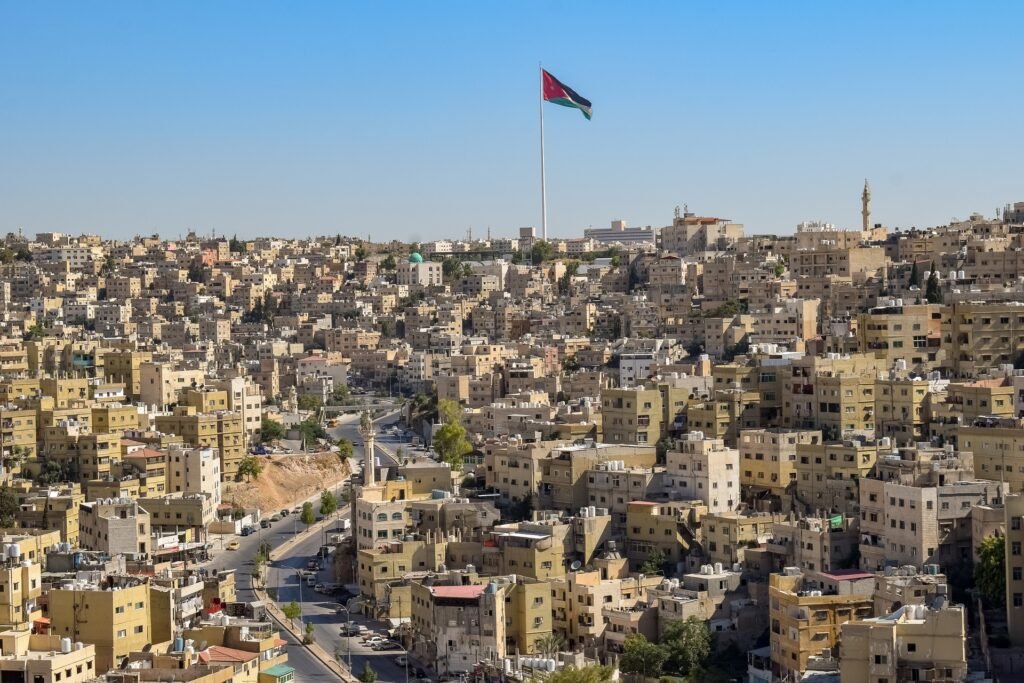Jordan’s beautiful desert landscape has seen its fair share of turmoil through the ages until the country finally achieved independence in its own right after the fall of the Ottoman Empire. Since then, many refugees from Palestine and Iraq have shaped the history and culture of the country and the borders have changed on more than one occasion.
These days Jordan is a very safe country and offers plenty to anyone wishing to visit. With so many places of interest and an excellent road network helping to reach the sites quickly, Jordan is the ideal getaway. The geographical location of the country also lends itself perfectly to a tour that combines the secrets of Egypt with the beauty of Jordan.
If you feel persuaded, have a look at one of our Jordan tours and prepare to explore and discover the wonders of this notable destination.
When to visit Jordan
As with many Middle Eastern countries, Jordan can be visited at any time of the year. The main component that determines when most people travel is the weather.
The peak months for western travellers does tend to be March to May and September to November when temperatures generally range from 20-28°C. During the summer months temperatures can reach 40°C in Amman which many visitors may find uncomfortable. You shouldn’t be put off visiting in the summer though as tourist numbers are much lower at this time of year and we always make adjustments to our tour itineraries to try and avoid the hottest parts of the day.
In the winter it can become quite cold in the north of Jordan and snow is not unheard of in Amman throughout the winter months. Even Petra has been known to get a light covering. Aqaba is an exception to this rule and remains balmy throughout the winter with an average temperature of 20°C in January.

The month of Ramadan
The Muslim festival of Ramadan lasts about a month and at this time of year tourists are discouraged from eating, drinking or smoking in public as this could be seen as a sign of disrespect. During Ramadan fasting is done in the daylight hours (for those of the Muslim Faith) and the evening meal (Iftar) is a very special occasion. Throughout Ramadan some tourist sites may close earlier than at other times of the year and we will take this into account when arranging your itinerary. You certainly shouldn’t be put off travelling to Jordan when Ramadan is taking place, as this can be a very interesting time to travel in the Arab world. Generally you will find that there is a festival feeling within the country and decorations line the streets.
Popular places to visit in Jordan
- Amman – Jordan’s capital city with plenty of sites nearby.
- Petra – a famous historical Nabataean city.
- Jerash – a former well-preserved Roman city.
- King’s Highway – a stretch of road to Wadi Mujib, Mount Nebo, Madaba and Kerak.
- Wadi Rum –a valley of stunning desert scenery.
- Aqaba – a region of Red Sea beaches and coral reefs.
Jordan weather & what to wear
The fact that Jordan is a desert country is reflected in its climate. Summers last from April to September and days can be very hot and dry while nights can get surprisingly chilly. The average temperature at this time is 16-26C. From November to March, winters are cool and dry with average temperatures falling to 7.5-15C. Not all of the country is desert and the fertile Jordan Valley has much milder summers and warmer winters although little rain. It’s only in the northwest hill regions that any significant rainfall occurs.
Light, airy clothes are essential in the summer, but you will need something warmer at night when the temperature drops. Bring warm clothes for both day and night if you are visiting during the winter.
Religions & rules
Jordan is an Islamic country with the 1997 estimate indicating around 96% of the population to be Sunni Muslim while 4% is Christian.
- Jordan is an Islamic country and therefore it is vital for all people to dress conservatively, particularly women. This is most important when entering mosques (shorts are not allowed), churches, synagogues and bazaars. With the obvious exception of the beach, it’s important to dress conservatively wherever possible.
- The conservative nature of the country extends to Jordanian women and they should never be touched without their consent. It’s regarded as inappropriate to display public shows of intimacy.
- When it comes to communal eating and social interaction, remember to always use your right hand. As with a lot of the Arab world, the left hand is for toilet duties. If you are lucky enough to be invited into a local’s house to eat, you must remove your shoes before entering and make sure to wash your hands before eating.
- Alcohol is widely available throughout the country, but it’s worth remembering that this is still considered forbidden by many Muslims and as a result you should always act with discretion and refrain from drinking in public.
- Tipping, or more locally baksheesh, is standard practice in Jordan and often helps subsidise extremely low wages. It’s important to understand that tipping is an appreciation for services rendered and how well this service is delivered so if you are not happy with the service then don’t tip. 0.5 JD is more than enough for hotel staff, porters and helpful site guards. Tips are usually expected in restaurants but check to see if your bill includes a service charge of 10% – if it does then it’s okay to simply round the bill up by a small amount. If no service charge is added, the minimum tip should be 10% of the cost of the meal.
- In shops on the street and pretty much everywhere you visit you will soon understand that Jordanians haggle for everything – and you will be expected to participate. It’s important to remain friendly and always barter with a smile for the best results. Street sellers are common, particularly in tourist areas, but exercise caution here as what they are trying to sell you may not always be what you think it is.
- Always be considerate when taking photographs – it’s simply polite to ask a person’s permission before taking pictures of them. Naturally, it’s against the law to photograph anything of a military nature such as bridges, railway stations, airports and other public works. Signs are usually posted in obvious places, but if not always err on the side of caution. Try and avoid flash photography when visiting important or ancient sites.
Safety in Jordan
We advise that you check with your local consular for up to date security information before you travel. Jordan is generally a safe place to travel however; tensions here can rise suddenly following changes in the whole Middle Eastern situation.
Jordan is one of the most progressive states in the region and is generally a very safe place to travel to. For the latest and most accurate advice you should always contact your local consular and gather as much information as you can before you travel. While Jordan is a peaceful country, its location in the Middle East means that regional tensions can inflame suddenly with little warning and the impact can sometimes be felt in Jordan.
In association with the ‘Know Before You Go’ campaign, we are working with the Foreign & Commonwealth Office (FCO) to do all that we can to help British travellers stay safe overseas. Before you go overseas, check out the FCO website at www.gov.uk/knowbeforeyougo. It is packed with essential travel advice, tips and up-to-date country information.
We do always recommend that you seek professional medical advice when considering holiday vaccinations, but the ones that are normally suggested for travel to Jordan are listed below:
- Diphtheria
- Hepatitis A
- Tetanus
- Typhoid
- Yellow Fever (a Yellow Fever vaccination certificate is required when arriving from an affected area)
For direct, up-to-date information on vaccination requirements for Jordan please click here.
Passports & visas
If you are travelling with a British, American, Australian, New Zealand or European passport then you can obtain your visa on arrival into Amman Airport or if crossing over by land from Egypt at Aqaba. The cost of the visa is 10 JD, approximately £8. You can pay for the visa in the local JD or hard currencies such as UK Pounds or US Dollars. You may also arrange your visa before travelling should you wish – this is usually more expensive at around £11. All visas issued are valid for stays of up to 15 days and can be multiple or single entry.
Note: If you are travelling in a group of 5 or more people, many nationalities will have their visa fee waived. Therefore, if you are travelling on a group tour we recommend that most nationalities simply wait and arrange their visa on arrival.
The majority of African passport holders and most Asian nationalities must arrange their visas for Jordan in advance of travel.
Currency
Jordanian Dinar (JD)
Common coins
- 1 Piastres
- 5 Piastres
- 10 Piastres
- 0.25 JD
- 0.5 JD
- 1 JD
Common notes
- 0.5 JD
- 1 JD
- 5 JD
- 10 JD
- 20 JD
- 50 JD
It’s possible to change money at any bank, exchange bureau or most hotels. Banks in Jordan tend to be open from 08.00 am to 12.00 pm Sunday – Thursday and again from 4.00 pm – 5.30 pm, but exchange bureaus are usually open all day. If using traveller’s cheques, you can expect to pay a small service charge per cheque.
ATMs are now available in most tourist areas and accept all major debit and credit cards. You can also use credit cards to pay for gifts, hotel rooms and other items. Visa and MasterCard are the most widely accepted cards while banks and exchange bureaus will also give cash advances against most bank cards. It’s worth remembering that payments in local currency are always preferred and that no black market currently exists in Jordan.



















